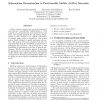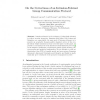219 search results - page 20 / 44 » Byzantine Quorum Systems |
SRDS
1999
IEEE
14 years 2 months ago
1999
IEEE
Ad-hoc wireless networks have no wired component, and may have unpredictable mobility pattern. Such networks can get partitioned and reconnected several times. One possible approa...
OPODIS
2007
13 years 11 months ago
2007
This paper tackles the consensus problem in asynchronous systems prone to byzantine failures. One way to circumvent the FLP impossibility result consists in adding synchrony assump...
PODC
2010
ACM
13 years 11 months ago
2010
ACM
In this paper, we consider the problem of maximizing the throughput of Byzantine agreement, when communication links have finite capacity. Byzantine agreement is a classical probl...
SPAA
2010
ACM
14 years 2 months ago
2010
ACM
In this work, we address Byzantine agreement in a message passing system with homonyms, i.e. a system with a number l of authenticated identities that is independent of the total ...
CHARME
2003
Springer
14 years 3 months ago
2003
Springer
Intrusion-tolerance is the technique of using fault-tolerance to achieve security properties. Assuming that faults, both benign and Byzantine, are unavoidable, the main goal of Int...




